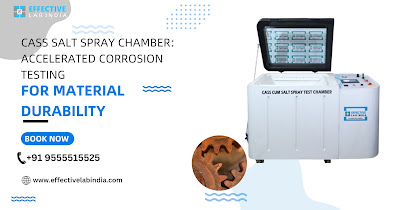CASS Salt Spray Chamber: Accelerated Corrosion Testing for Material Durability
The abbreviated form of CASS, which stands for Copper Accelerated Acetic Acid Salt Spray, is commonly used in corrosion testing procedures. Particularly in the automotive and aerospace industries, this salt spray chamber is frequently used to mimic and speed up the corrosion processes on metal surfaces.
In the CASS test, specimens are subjected to a corrosive environment that includes a salt spray that contains a particular solution of acetic acid in order to evaluate the material's resistance to corrosion. The performance and longevity of materials, coatings, and finishes under challenging circumstances must be assessed, and this testing is essential.
What is the uses Cass Cum Test Chamber?
In order to evaluate whether rust-proofed components can resist corrosion brought on by atmospheric circumstances, the Effective Lab CASS Test Chamber was meticulously built in accordance with the applicable standard with glass wool insulation, it has three walls. We have equipped our manufacturing company with a cutting-edge Cass Salt Spray Test Chamber. This chamber plays a pivotal role in ensuring the quality and durability of our products by subjecting them to rigorous corrosion resistance testing. Our team of skilled technicians utilizes the Cass Cum Salt Spray Test Chamber to simulate harsh environmental conditions, allowing us to develop and produce high-performance materials and coatings that meet and exceed industry standards. With the Cass Cum Salt Spray Test Chamber at the core of our testing procedures, we guarantee that our products are built to withstand the harshest conditions and deliver unmatched quality and reliability to our customers.
General Information on Cass Test Chamber
Cass Salt Spray Chamber is the most advanced and versatile instrument which allows you to copper resist corrosion of a surface coating. With the help of this instrument, you can check whether a copper specimen should withstand environmental conditions or not.
Range of Temperature: 0 to 60 degrees Celsius. (Required Temperature: 49 +/- 2 degrees Celsius)
Accuracy of Temperature: +/-1 degree Celsius.
Temperature Control: Using a special Zero Corrosion PT 100 sensor, a solid-state digital programmable temperature controller accompanied by an indicator.
Air Regulator: There is an air regulator with a pressure range of 0 to 30 psi and a moisture cum oil filter.
Construction: FRP (Fibre Reinforced Plastic) construction
Standard Facilities: Air purging, a time totalizer, a cyclic timer, regulators, gauges, and specimen racks are features that are included with every model.
Procedure of testing in a Cass test chamber
In testing a cass test chamber, the sample is first cleaned and then it is ready to be tested for contaminants in a Cass test. Then, it is put into the test chamber. In addition, a corrosive environment is created by the copper chloride solution that fills the chamber.
After that, the test chamber is heated to a predetermined temperature and kept consistently humid. The corrosive solution, heat, and humidity all work together to speed up the corrosion process.
Following the exposure time, the sample is taken out of the chamber and examined for corrosion indicators, like rust or discoloration. This helps in evaluating how well the material resists corrosion.
Use of Cass Cum Test Chamber
The Cass cum salt spray test chamber is used to assess the ability of a material to withstand corrosion, particularly coatings and finishes. It assists in simulating elements of the real environment, such as humidity, drying cycles, and salt spray. This testing technique is frequently used in the aerospace and automotive industries to verify the efficacy and longevity of materials in corrosive environments. The chamber evaluates how well coatings and finishes prevent corrosion by exposing the samples to these repeated exposures. The Cass test chamber is a useful tool for research and quality assurance in many industries.
Working process of Cass Cum testing chamber
The Cass Cum test chamber operates by putting test samples through a cycle of corrosion testing. This test subjects the samples to cycles of humidity, drying, and salt spray, simulating real-world environmental conditions. The salt spray, or mist of a salt solution, is first introduced to the samples in a controlled environment created by the test chamber. The corrosion process is sped up as a result of the corrosive environment this produces. After that, the samples are exposed to high humidity levels, and a drying phase comes next. This repeated exposure aids in simulating the corrosive impacts of various environmental circumstances. Following the test, the samples are inspected for corrosion in order to determine how well coatings and finishes prevent corrosion.
Manufacturer of Cass Test Chamber
There are several manufacturers of Case Test chambers which vary accordingly. If you are looking for the best manufacturer of Cass Test chamber in Faridabad, India then you are at the right place.
By simulating harsh environmental conditions in the Cass Cum Salt Spray Test Chamber, our team of highly skilled technicians can develop and produce high-performance materials and coatings that meet industry standards. Our testing processes are centred around the Cass Salt Spray Test Chamber, which allows us to ensure that our products are designed to withstand the most extreme circumstances while providing our customers with unrivalled quality and dependability.

%20(1).jpg)


Comments
Post a Comment